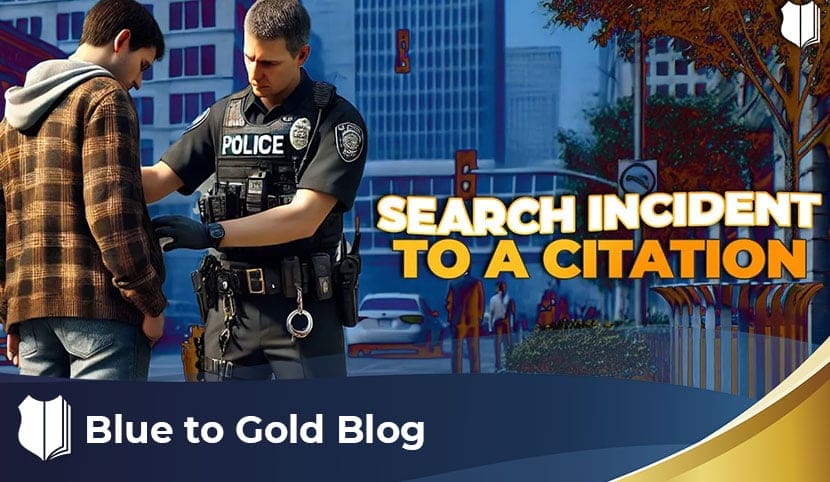Can you make a search incident to arrest even if you’re not planning to formally arrest the person and just issue a citation?
Today’s question comes from an officer in Colorado. He essentially asked, “If I have probable cause to issue a citation for paraphernalia, can I also search their backpack or their person? Can I look for more drugs or paraphernalia? Then, based on what I find, decide whether to arrest them or issue a citation? For example, if I find drugs, they’ll go to jail; otherwise, I’ll issue the citation.”
Let’s start with the basics: you cannot conduct a search incident to arrest if you’re not making a formal arrest.
Search Incident to Arrest Doctrine
A search incident to arrest allows you to search someone without needing a specific reason to believe they are armed, possess evidence, or have a means of escape. It’s a doctrine designed to ensure safety and preserve evidence when transporting a person to jail. The U.S. Supreme Court, in Chimel v. California, established this as a routine practice. Even for minor offenses like a misdemeanor warrant for a traffic violation, most states allow a full search incident to arrest without requiring additional justification.
However, in Knowles v. Iowa, the Supreme Court clarified that probable cause alone doesn’t justify a search incident to arrest if no formal arrest is made.
In Knowles, an officer stopped someone for a traffic violation. The officer, permitted by Iowa law, could have arrested the driver but instead issued a citation while conducting a full search. The Supreme Court ruled this behavior unconstitutional, emphasizing that a search incident to arrest is tied to the decision to arrest, not the mere ability to do so.
Courts Allowing Exceptions
Some courts have permitted officers to perform searches incident to arrest in cases where the officer could have arrested the person but didn’t, later formalizing the arrest if contraband was found. These courts reason that if the arrest was ultimately lawful, the search could be justified.
However, this approach raises ethical and constitutional concerns. I do not teach officers to play this game. It’s unfair and violates the principles outlined by the Supreme Court. If you’re not going to arrest someone, don’t conduct a search incident to arrest. Use your discretion: if the arrest is appropriate, make the arrest and conduct the search properly.
Limited Searches Under Exigent Circumstances
There is one exception worth noting: if you have probable cause to believe the person possesses evidence, and there is an exigency (e.g., the evidence might be destroyed or lost), you can conduct a limited search to recover that evidence without formally arresting them.
Example: Shoplifting
Consider a shoplifting case. Many jurisdictions don’t transport people for petty larceny. However, if you have probable cause to believe stolen property is still in their backpack, you can make a limited search to recover the evidence. Without this search, the stolen property might be lost permanently.
Courts generally uphold such limited searches under exigent circumstances. In United States v. Schneider (N.D. Iowa), the court outlined the factors justifying such searches:
- Probable Cause for the Search: There must be probable cause to believe evidence is present.
- Suspect Awareness: The suspect knows about the probable cause, creating a risk they might destroy or conceal evidence.
- Evidence Must Be at Risk of Destruction: The evidence must be something that can be easily destroyed or lost.
- Search Must Be Limited: The search must be narrowly tailored to recover the specific evidence.
Case Example: Murphy v. Cupp
In Murphy v. Cupp, the defendant was under suspicion for murder. While at the police station, officers noticed dried blood under his fingernails. They conducted a limited search to recover the evidence without formally arresting him, as they were still building their case. The Supreme Court upheld this as a lawful search under exigent circumstances.
Practical Application
Returning to the officer’s question:
If you’re not planning to arrest someone but have probable cause to believe they possess evidence (e.g., drugs), and there’s a risk that the evidence might be destroyed or lost, you can conduct a limited search under exigent circumstances. However, this is not a search incident to arrest.
Document the search thoroughly, including:
- Probable cause for the search.
- Exigent circumstances (e.g., risk of evidence destruction).
- The limited scope of the search.
If during this search you find additional contraband (e.g., more drugs than expected), you may then decide to make an arrest.
Final Thoughts
This is a nuanced issue, and while some courts have allowed exceptions, the best practice is to operate within clear constitutional guidelines. Avoid conducting searches without a firm legal foundation.











